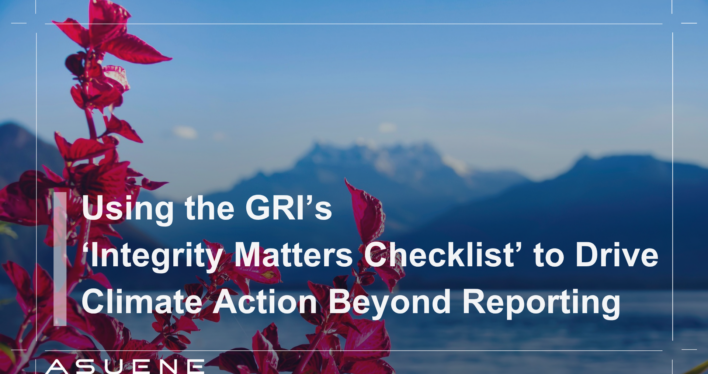- Article Summary
-
Introduction
In November 2025 the GRI Integrity Matters Checklist was released as a new resource for organizations seeking to strengthen climate accountability. Stakeholders no longer evaluate companies only on the transparency of their reporting but on the credibility of their plans and the actions that follow. Many organizations continue to struggle with fragmented expectations, overlapping frameworks and internal uncertainty about what constitutes high integrity climate practice. The GRI Integrity Matters Checklist provides a structured and practical tool for companies seeking to strengthen climate accountability. It supports organizations in moving from intention to execution by offering clear expectations on transition planning, emissions reduction, fossil fuel alignment, verification and social impact considerations. As climate risk intensifies globally, companies are under growing pressure to demonstrate meaningful progress. This article explores how the checklist can be applied across functions to align climate reporting with operational decision making.
Check out GRI’s Integrity Matters Checklist: https://www.globalreporting.org/news/news-center/gri-launches-new-tool-for-corporate-climate-action/
Cross Functional Mapping of Checklist Expectations
The table below provides a simplified cross functional mapping of how key checklist elements can translate into practical actions within an organization.
| Key Checklist Item | Function Responsible | Required Action |
|---|---|---|
| Publish a science aligned transition plan | Strategy | Develop milestones, governance structures and implementation roadmaps |
| Demonstrate alignment with fossil fuel phase down commitments | Operations | Conduct asset level transition assessments and prioritize decarbonization projects |
| Assess social impacts on workers and communities | HR and Community Relations | Conduct impact assessments, engage stakeholders and outline mitigation actions |
| Verify greenhouse gas data externally | Finance and Reporting | Engage independent assurance providers and integrate results into reporting processes |
| Integrate value chain emissions analysis | Procurement | Collect supplier data, evaluate risk profiles and support supplier improvement programs |
Reporting Fatigue and the Need for Clarity and the Need for Clarity
Sustainability teams are overwhelmed by increasing disclosure requirements and shifting regulatory landscapes. Companies often reference multiple standards and reporting systems without a common thread that connects them. This creates duplication, inefficiency and uncertainty about which information is essential for credible climate performance. The GRI Integrity Matters Checklist helps bring coherence to this environment by aligning with the recommendations of the United Nations High Level Expert Group on net zero commitments. It consolidates expectations around transparent targets, credible transition plans, independent validation of emissions data and alignment with science based pathways. By presenting these items in a structured and comprehensible format, the checklist reduces reporting fatigue and supports companies in focusing on the information that matters most for accountability. Rather than competing with existing frameworks, it acts as a bridge that helps organizations integrate current reporting practices into a consistent approach.
Embedding Just Transition Principles
Climate transition is not limited to emissions. It involves profound economic and social change that impacts workers, communities and Indigenous Peoples. The Integrity Matters Checklist highlights these social dimensions and encourages companies to evaluate how their climate actions influence people across their value chains. Key elements include assessment of social risks, transparent communication with communities, recognition of Indigenous rights and the development of workforce transition strategies. A just transition approach strengthens business resilience because it builds trust with stakeholders and reduces potential conflicts. It also aligns with emerging investor expectations, as financial institutions increasingly incorporate social considerations into climate related decision making. By embedding these principles in the checklist, GRI provides a pathway for organizations to incorporate social impact analysis into climate strategy rather than addressing it as a standalone exercise.

Applying the Checklist Across Internal Functions
The Integrity Matters Checklist can serve as a practical tool for internal teams responsible for planning and executing climate strategy. Strategy departments can use it to align long term transition plans with science based pathways and to define milestones that clarify the company’s trajectory. Operations teams can apply it to assess facility level emissions, evaluate asset transition risks and prioritize decarbonization investments. Procurement departments can integrate checklist items into supplier engagement programs by aligning questionnaires, risk assessments and supplier improvement plans with expectations for integrity. Finance teams can reference checklist criteria when reviewing capital allocation, financing structures and scenario planning. Human Resources departments can apply the checklist when preparing for workforce transitions by developing reskilling plans and identifying potential social risks related to job changes. These functional applications transform the checklist into a decision making tool that supports cross departmental coordination. Hypothetical examples include a manufacturing company updating supplier audit templates to reflect integrity criteria or an energy company using the checklist to guide its transition planning for legacy assets.
Conclusion
The GRI Integrity Matters Checklist provides companies with a structured and credible approach to strengthening climate accountability. It integrates environmental and social considerations, clarifies expectations, and helps organizations reduce inefficiencies caused by overlapping reporting frameworks. When applied across internal functions, the checklist becomes a guide for operational decision making rather than a document used solely for disclosure. Companies that adopt this approach will be better equipped to demonstrate progress, build trust with stakeholders and prepare for a rapidly evolving regulatory environment. As climate expectations continue to rise, tools that support consistent and actionable climate planning will become increasingly essential. The Integrity Matters Checklist offers a pathway for organizations to enhance the integrity and impact of their climate strategies.regulatory environment. As climate expectations continue to rise, tools that support consistent and actionable climate planning will become increasingly essential. The Integrity Matters Checklist offers a pathway for organizations to enhance the integrity and impact of their climate strategies.
Why Work with ASUENE Inc.?
ASUENE is a key player in carbon accounting, offering a comprehensive platform that measures, reduces, and reports emissions. The company serves over 10,000 clients worldwide with an all-in-one solution that integrates GHG accounting, ESG supply chain management, a Carbon Credit exchange platform, and third-party verification.
ASUENE supports companies in achieving net-zero goals through advanced technology, consulting services, and an extensive network.


